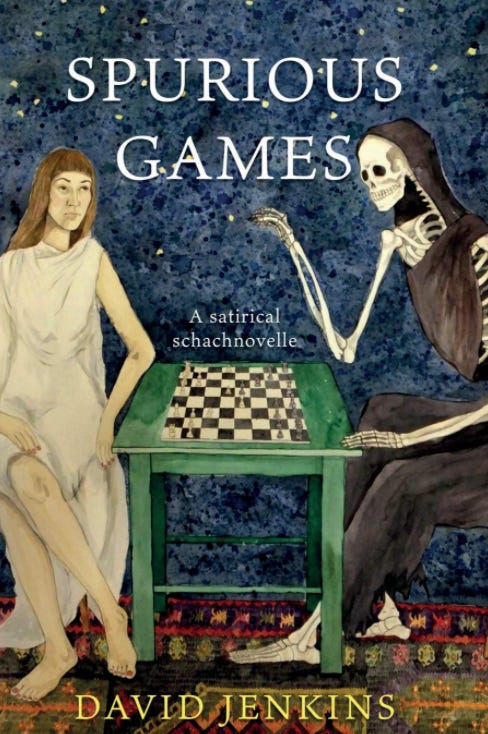“My hunch is that we are dealing with a chess-obsessed crackpot…” suggests DI Logos, in David Jenkins’ enjoyable detective novel. Readers will certainly view the notion of a “poisoned pawn” somewhat differently after reading this excellent book.
The Cornish chess scene is in the throes of a crisis, with a serial killer on the loose. Those who share a surname with a chess piece appear to be particularly at risk. The murderer, otherwise known as either “The Turk” or “The Chess Skewer,” is leaving clues in the form of chess puzzles. The authorities will need to determine whether chess, the psychic world or more traditional policing methods hold the key to solving these heinous crimes.
Our protagonist DI John Logos is a well-drawn character. From his failing eyesight through to his bulging belly, disastrous marriage, and career frustrations he feels entirely believable. His sharp-brain and love of chess have kept him hanging on. When he goes out for a work dinner with a younger and more glamorous colleague “… even in his inebriated state he did not begin to confuse Charlotte’s impulsive peck on his cheek with a goodnight kiss.”
Spurious Games is at the comic rather than the gritty end of the murder mystery spectrum, but this in no way means that it is not substantive. As David Jenkins outlines, “A spurious game is a spoof encounter that one or both players claim to have played over the board but was in reality invented or “improved” for some nefarious purpose like claiming a brilliancy prize.” This serves as a metaphor for the novel, which is essentially a story about the need to determine what is truly authentic within a world where little is as it first seems.
Jenkins has a strong academic and intellectual hinterland, which he combines with a lightness of touch and deft comic timing. Spurious Games has a lot for chess and non-chess players alike to think through if they wish, but equally a reader who is content just to follow the story and to laugh along at some of the disastrous endings that befall the chess player victims can simply do that. I do not want to share any spoilers, but Jenkins has a wickedly good imagination which he puts to great use in considering what might be done with a chess clock and a chocolate pawn, amongst other things.
The notion of a University having a “Professor of Plagiarism” who spends most of his time explaining that his job is not exactly as it sounds, is one of many nice touches. Perhaps Logos aside, the rest of the characters in the book are somewhat more two dimensional, but they are sufficiently well-drawn for the purposes of the genre. It is a nice touch by Jenkins to weave some real chess players into the story. Jenkins has the chess-world down to a tee in his descriptions of players who do not drive. His broader articulation as to the frustrations all of us who are gripped by the game inevitably feel from time to time could only have been written by a chess player.
Spurious Games is beautifully produced with some fine art within it. This is the sort of book that looks as good on your shelf as it is to have Jenkins’ story in your head. Perhaps I was not quite as vested in knowing who the killer was as I might have been. That said, the way in which the murderer eventually confesses is a brilliant illustration of Jenkins at his best in terms of mixing the comic and the philosophical.
At one point in Spurious Games, Jenkins writes “Owen Rhys was aware, of course, that his dedication to chess was absurd given his modest level of play and that it was preventing him from writing the detective novel he had promised the world for the last half century.” Who knows whether Owen Rhys will ever fulfil his literary dream? David Jenkins certainly has.
Spurious Games is both funny and clever and far-removed from your average “Who dunnit?” I am not surprised by the online buzz this book is generating. A terrific effort. David Jenkins should be proud of what he has achieved. A debut novel truly worth the wait.
See http://spuriousgames.org/ for more information and entertainment!




